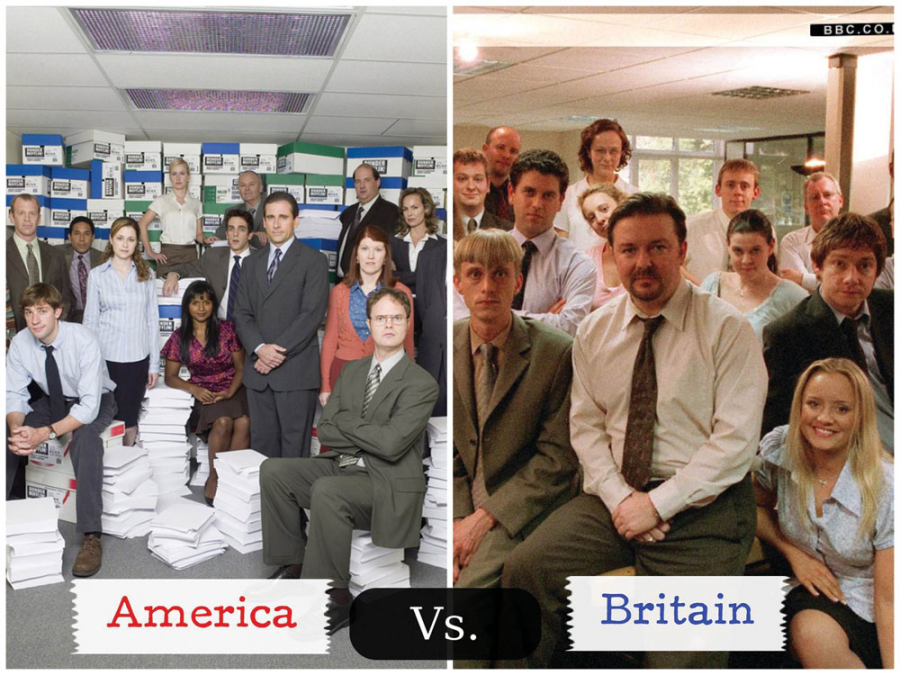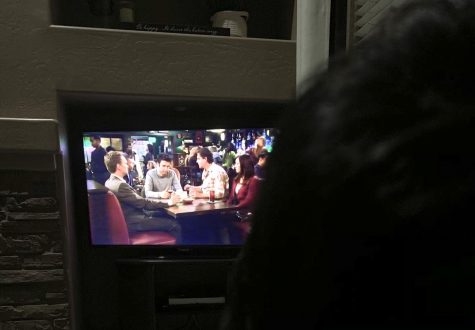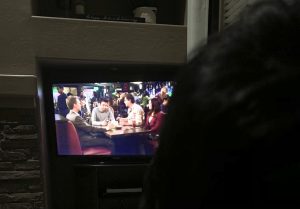Battle of the Nations, A.K.A “The Office”
Ever since the United States of America was formed and the 13 colonies gained independence from Britain, our two nations have fought, but no battle is more important than the battle between the U.K. and U.S. versions of “The Office.”
Despite being practically the same, the U.S. and U.K. versions of “The Office” have several differences.
April 2, 2021
On July 9, 2001, Britain was introduced to “The Office,” a small sitcom show that would depict simple paper merchants in the small town of Slough. Made by the BBC, the country loved it. It gained a cult following that would live on ever since. The people loved its dry and more complex way of humor. The love couldn’t just be held in Britain, though, and thus, NBC decided to put their own American spin on the show. “The Office” would be introduced in America as “The Office” (how original) on March 24, 2005, and American comedy was shaken and never the same again. Ever since then, people have been discussing the many differences and similarities between the two shows ever since.
The most noticeable difference between the two versions is the tone. The humor in the U.K. is known for being much more pessimistic and will usually end on a negative note, whereas in America, comedies, at least then, were known for their optimistic, lovable characters with a laugh track. American comedies are also known for ending on a positive note, a sharp contrast from the pessimistic outlook of British comedy. The original creator of “The Office,” Stephen Merchant, helps to explain by saying that the people living in the United States and United Kingdom are the reason behind this. He says that Americans are more hopeful and optimistic for the future while the British people are more comfortable with failure, something easily seen from the British and American shows.
The British version of “The Office” is known for its sad and even depressing endings. We watch as people fail and make mistakes that lead to realistic consequences. An example of this is in the season two episode “Charity,” where the branch holds a fun comic relief day to raise money for charity. The whole episode, David Brent, the general manager in the office, is trying to brighten the mood. The episode is unusually cheerful, that is until around the last ten minutes. David Brent is given a redundancy package, or put simply, was fired. The whole rest of the episode and the last episode, David comes to reality that no one truly cares about him and no one ever thought of him as a friend, crushing his perspective. All the while he has to dress up in a costume and act silly. It’s sad and yet proves to be funny anyway. All the while the U.S. show sticks with a more silly and upbeat tone where everything always proves to work out just fine. For example, the plotline where Michael, the David Brent of the American Office, quits. Instead of the normal leaving, which would be completely permanent and lead to the end of the show, Michael decides to create a new paper company called the “Michael Scott Paper Company” with Pam and Ryan, two other main characters. This company does so well that it even starts to hurt Michael’s original company of Dunder Mifflin. This causes the Michael Scott Paper Company to get bought out in return for Michael, Pam, and Ryan to have their jobs back, with Ryan getting a temp position at the workplace. In the end, everything always works out, with some cheerful laughs along the way.
Something that goes along with the tone of the show are the characters. While both America and Britain have their differences in characters, most of the main ones have their own depiction in both shows. David Brent translates to Michael Scott, Tim goes to Jim, Dawn to Pam, Gareth to Dwight, and more. The first main difference is seen in the “side characters.” In Britain’s version of the show, it is much more focused on certain characters, just usually the ones mentioned beforehand with some others. Meanwhile, the American version decided to take a different approach. They took time to develop those characters until none felt like side characters. It is much easier to recite the names of every employee in the American adaptation than it is in the original. It’s a more varied experience, although less focused.
But the characters are also fundamentally different, like how the tone of every character in the U.K version is much more awkward and weird in a much more realistic way. The biggest examples of this are the two managers themselves. David Brent is someone we all know. The man who wants to be admired by everyone. To be famous. He holds onto his dreams of his youth where he dreamt of becoming a rockstar. His wildest dream in life is to be popular, famous, and liked by all. And yet by deliberately trying to show his coworkers that he is a good person with strong morals, it instead comes off the exact opposite. He also tries to be popular by doing “edgy” things, but his coworkers just see him as a lazy and weird boss. He’s the person who just wants to fit in and yet it backfires completely. It’s just too relatable, and even leads many to disliking him as a character. The character reminds the audience of the type of person that anyone can see in the real world, something that can lead to resentment. Everything he does is a failure because of his unrealistic expectations of himself and how others will perceive him. Michael on the other hand, cares about love. He wants everyone, not to admire him, but to love and like him. In some episodes you get a glimpse into his childhood, where he felt alone. He wants love and the best of friends. And while at first he follows the same path as David Brent, he instead does something else. Everything he does is almost as a child. He plays with toys, has a short attention span, and makes decisions without thought. Because of this we can’t help but like him. You can’t blame him for something that he did because that’s just because of his ignorance.
While the two may have their main similarities, in the end they are both different shows. Both succeeded for their own reasons, and even gained a massive amount of popularity. But in the end, as people always say, “Comedy is subjective.” Both shows have a different type of humor meant for a different audience to fit within their countries’ general views on comedy. Nonetheless, that does not mean that one show is better than another. Even though many have argued for both sides, the “Battle of ‘The Office’s” seems to be at a standstill, and the struggle for world domination may never see it through.
















